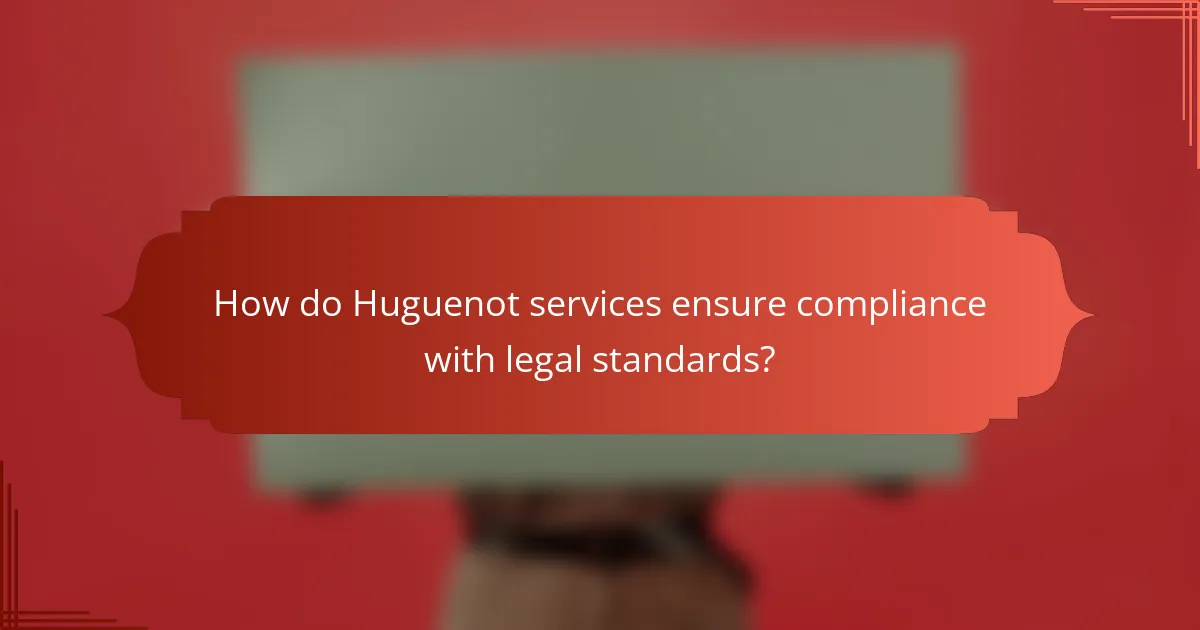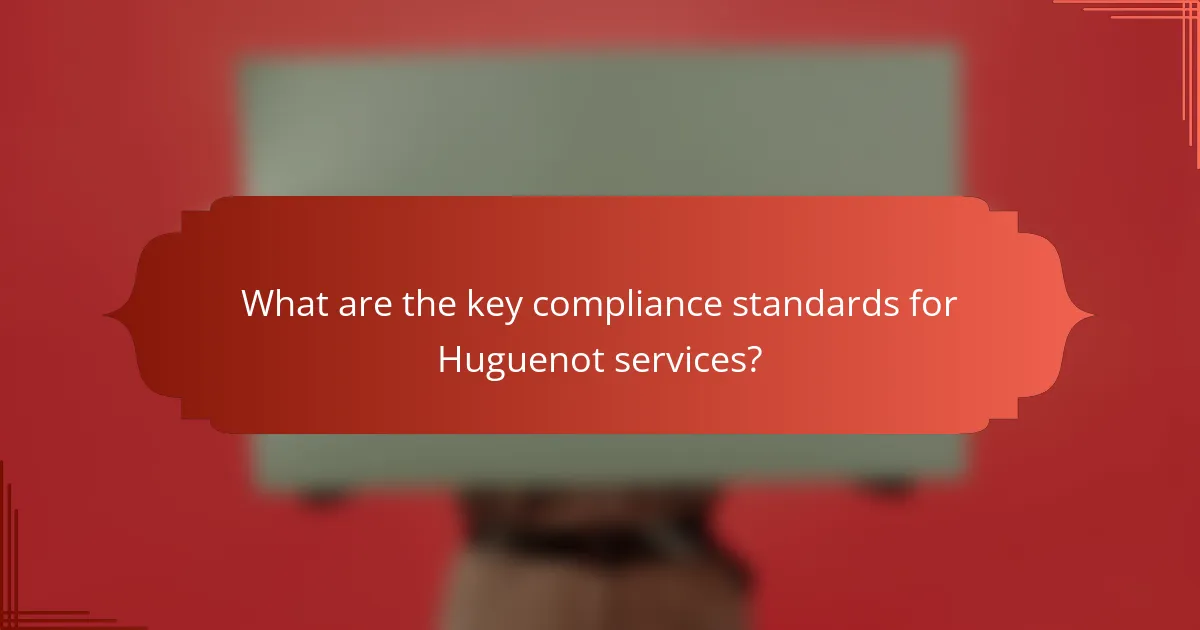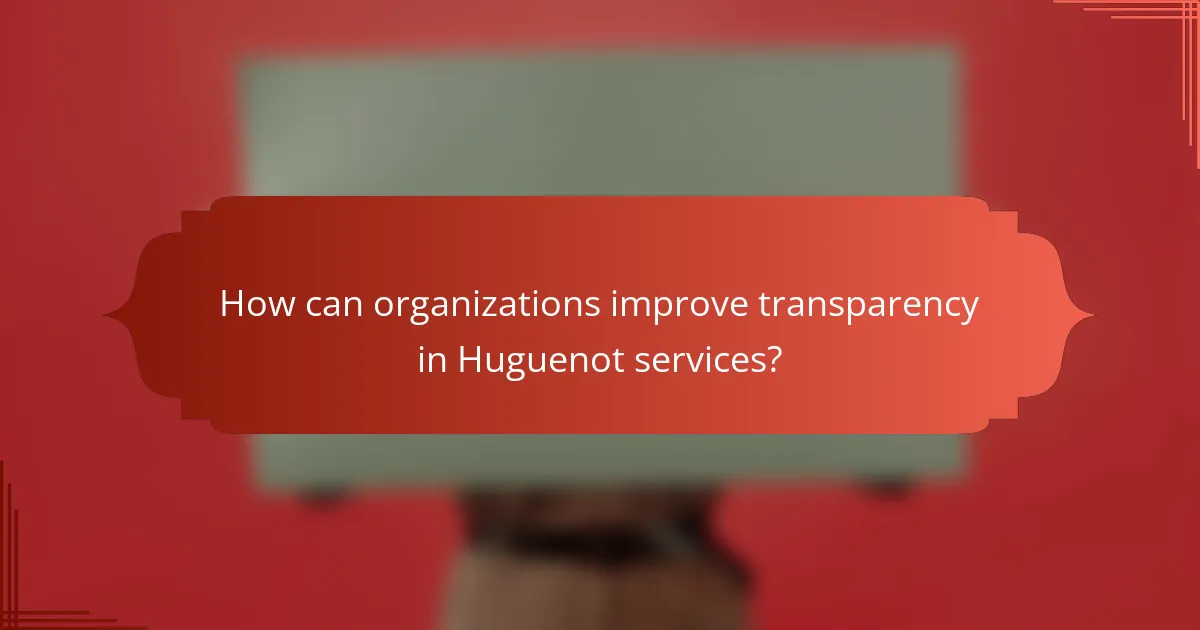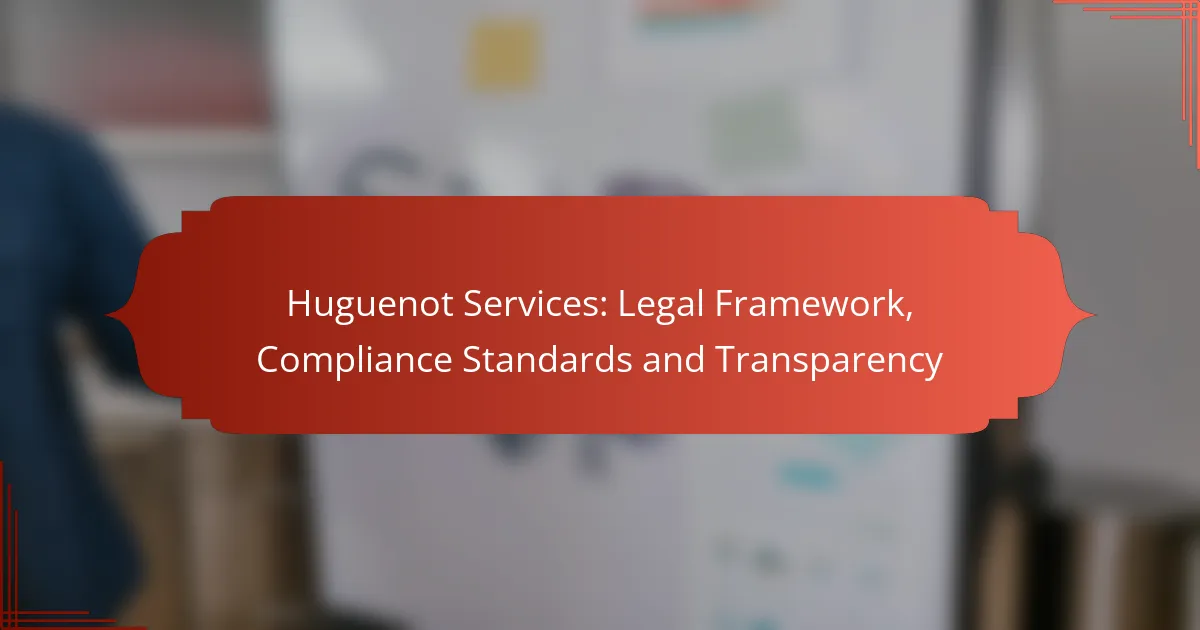The legal frameworks governing Huguenot services in Ireland are designed to ensure compliance and transparency, focusing on charity operations, data protection, and non-profit standards. By implementing systematic processes such as regular audits and staff training, these services maintain adherence to legal requirements, fostering public trust and accountability. Transparency measures, including publicly available financial statements and annual reports, further enhance stakeholder engagement and insight into their operations.

What are the legal frameworks governing Huguenot services in Ireland?
The legal frameworks governing Huguenot services in Ireland include several key regulations that ensure compliance and transparency. These frameworks primarily focus on charity operations, data protection, and non-profit organization standards, which are essential for maintaining public trust and accountability.
Irish Charities Act 2009
The Irish Charities Act 2009 establishes the legal structure for charities operating in Ireland, including Huguenot services. This act requires organizations to register with the Charities Regulatory Authority, ensuring they meet specific governance and operational standards.
Under this act, charities must maintain transparency in their financial reporting and adhere to strict guidelines regarding fundraising practices. Failure to comply can result in penalties or loss of charitable status.
Data Protection Act 2018
The Data Protection Act 2018 governs how organizations handle personal data, aligning with the General Data Protection Regulation (GDPR). Huguenot services must ensure that any personal information they collect is processed lawfully, transparently, and securely.
Organizations are required to implement appropriate measures to protect personal data and must inform individuals about their rights regarding their information. Non-compliance can lead to significant fines and reputational damage.
Non-Profit Organization Regulations
Non-profit organization regulations in Ireland outline the operational standards for entities that do not distribute profits to members. Huguenot services must adhere to these regulations to maintain their non-profit status.
Key considerations include ensuring that funds are used for the intended charitable purposes and that governance structures are in place to prevent conflicts of interest. Regular audits and compliance checks are recommended to uphold these standards and foster trust within the community.

How do Huguenot services ensure compliance with legal standards?
Huguenot services maintain compliance with legal standards through systematic processes that include regular audits, staff training, and adherence to financial reporting requirements. These practices help ensure that operations align with applicable laws and regulations, fostering transparency and accountability.
Regular audits and assessments
Regular audits and assessments are essential for Huguenot services to identify compliance gaps and ensure adherence to legal standards. These audits typically occur annually or biannually and involve reviewing operational procedures, financial records, and compliance with relevant regulations.
During these assessments, external auditors may be engaged to provide an unbiased evaluation. This practice not only enhances transparency but also builds trust with stakeholders and clients.
Staff training on compliance
Staff training on compliance is crucial for Huguenot services to ensure that all employees understand their roles in maintaining legal standards. Training sessions should cover relevant laws, ethical practices, and internal policies, typically conducted at onboarding and periodically thereafter.
Effective training programs often include practical scenarios and assessments to reinforce learning. Regular updates on changes in legislation are also vital to keep staff informed and compliant.
Adherence to financial reporting standards
Adherence to financial reporting standards is a key component of compliance for Huguenot services. This involves preparing financial statements that accurately reflect the organization’s financial position and operations, following guidelines such as IFRS or GAAP, depending on the jurisdiction.
Organizations must ensure that their financial reports are transparent and accessible to stakeholders. Regular reviews and updates to financial practices help maintain compliance and build credibility with clients and regulatory bodies.

What transparency measures are in place for Huguenot services?
Huguenot services implement several transparency measures to ensure accountability and trust. These measures include publicly available financial statements, annual reports, and stakeholder engagement initiatives that provide insight into operations and impact.
Publicly available financial statements
Financial statements for Huguenot services are typically published annually and made accessible to the public. These documents include balance sheets, income statements, and cash flow statements, allowing stakeholders to assess the financial health and sustainability of the services.
To enhance transparency, these financial reports often follow recognized accounting standards, ensuring consistency and reliability. Stakeholders can review these statements to evaluate how funds are allocated and spent, which is crucial for maintaining trust.
Annual reports and impact assessments
Annual reports provide a comprehensive overview of Huguenot services’ activities, achievements, and challenges over the year. These reports often include qualitative and quantitative data, showcasing the impact of services on the community and the effectiveness of various programs.
Impact assessments are conducted to measure the outcomes of specific initiatives, helping to identify areas for improvement. These assessments are usually included in annual reports, providing stakeholders with a clear picture of the services’ contributions and effectiveness.
Stakeholder engagement initiatives
Huguenot services actively engage with stakeholders through various initiatives, such as community meetings, surveys, and feedback sessions. These initiatives allow stakeholders to voice their opinions, concerns, and suggestions, fostering a collaborative environment.
By involving stakeholders in decision-making processes, Huguenot services can better align their operations with community needs. Regular updates and open communication channels help maintain transparency and build stronger relationships with those they serve.

What are the key compliance standards for Huguenot services?
The key compliance standards for Huguenot services include ISO 9001 Quality Management, the Charity Governance Code, and Health and Safety Regulations. These standards ensure that services are delivered effectively, ethically, and safely, maintaining transparency and accountability in operations.
ISO 9001 Quality Management
ISO 9001 is an international standard that specifies requirements for a quality management system (QMS). Organizations providing Huguenot services must establish processes to enhance customer satisfaction by meeting client needs and regulatory requirements.
To comply with ISO 9001, Huguenot services should focus on continuous improvement, stakeholder engagement, and effective process management. Regular audits and feedback mechanisms are essential to identify areas for enhancement.
Charity Governance Code
The Charity Governance Code provides a framework for good governance in charities, including those offering Huguenot services. It emphasizes accountability, transparency, and ethical practices in decision-making and operations.
Organizations should adopt the principles of the code, such as ensuring that their boards are diverse and effective, and that they engage with stakeholders. Regular reviews of governance practices can help maintain compliance and build trust with the community.
Health and Safety Regulations
Health and Safety Regulations are crucial for ensuring the well-being of both service providers and recipients in Huguenot services. Compliance involves identifying potential hazards and implementing measures to mitigate risks.
Organizations should conduct regular risk assessments and provide training to staff on safety protocols. Keeping accurate records of incidents and safety measures is also vital for compliance and continuous improvement in health and safety practices.

How can organizations improve transparency in Huguenot services?
Organizations can enhance transparency in Huguenot services by adopting clear policies and practices that promote openness and accountability. This involves implementing open data initiatives and improving communication strategies to ensure stakeholders are well-informed about operations and decision-making processes.
Implementing open data policies
Open data policies allow organizations to share relevant information with the public, fostering trust and engagement. By making data on services, funding, and outcomes accessible, organizations can demonstrate their commitment to transparency.
Consider establishing a dedicated online platform where stakeholders can easily access data sets. Regularly updating this information and providing context can help users understand the implications of the data. For example, publishing annual reports that summarize service performance can be beneficial.
Enhancing communication strategies
Effective communication strategies are crucial for improving transparency in Huguenot services. Organizations should prioritize clear messaging and ensure that information is disseminated through multiple channels, including newsletters, social media, and community meetings.
Engaging with stakeholders through regular updates and feedback sessions can build trust and encourage participation. Additionally, training staff on effective communication techniques can help ensure that messages are consistent and accessible to diverse audiences.
